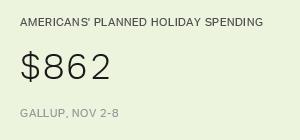Thanksgiving is a treasured American tradition that also marks the unofficial start to the Christmas shopping season as well as pulls the country together for important football games. Those three truths conspired to give President Franklin Roosevelt a political headache when he agreed in August 1939 to move Thanksgiving to a week earlier to support retailers who worried that the original Nov. 30 date would hinder holiday sales. A ║┌┴¤═° poll found just 30% of Americans approving of Roosevelt's decision, 50% disapproving and another 20% ambivalent.
| U.S. adults | |||||||||||||||||||||||||||||||||||||||||||||||||||||||||||||||||||||||||||||||||||||||||||||||||||
|---|---|---|---|---|---|---|---|---|---|---|---|---|---|---|---|---|---|---|---|---|---|---|---|---|---|---|---|---|---|---|---|---|---|---|---|---|---|---|---|---|---|---|---|---|---|---|---|---|---|---|---|---|---|---|---|---|---|---|---|---|---|---|---|---|---|---|---|---|---|---|---|---|---|---|---|---|---|---|---|---|---|---|---|---|---|---|---|---|---|---|---|---|---|---|---|---|---|---|---|
| % | |||||||||||||||||||||||||||||||||||||||||||||||||||||||||||||||||||||||||||||||||||||||||||||||||||
| Approve | 30 | ||||||||||||||||||||||||||||||||||||||||||||||||||||||||||||||||||||||||||||||||||||||||||||||||||
| Disapprove | 50 | ||||||||||||||||||||||||||||||||||||||||||||||||||||||||||||||||||||||||||||||||||||||||||||||||||
| No opinion | 20 | ||||||||||||||||||||||||||||||||||||||||||||||||||||||||||||||||||||||||||||||||||||||||||||||||||
| GALLUP, Aug. 19-24, 1939 | |||||||||||||||||||||||||||||||||||||||||||||||||||||||||||||||||||||||||||||||||||||||||||||||||||
Thanksgiving celebrations date back to colonial times in the U.S., while the modern holiday started with Abraham Lincoln, who in 1863 declared it should be celebrated annually on the last Thursday of November. But in November 1939 there were five Thursdays, with the last one falling on the 30th.
Roosevelt went ahead with the date change, but historical accounts indicate the decision set off a partisan storm. Republican leaders denounced Roosevelt for destroying tradition. Football teams fretted that their stands would be half-empty for the big holiday game. And Republican governors resisted, leading to less than half of the then-48 states going along with the new date.
The issue also stoked partisanship in the public at large as, according to the original news release, a slight majority of Democrats (52%) approved of the plan while nearly four in five Republicans (79%) opposed it. (This was with the percentage holding no opinion removed.)
George ║┌┴¤═°'s original account of Republicans' reactions indicates the extent to which Roosevelt touched a nerve. According to ║┌┴¤═°, "'Dictatorship,' 'whimsy' and 'just upsetting everything he can' are some of the typical charges leveled against the president's plan. In general, the comments of the Republican man-in-the-street echo the sentiments of Alf M. Landon, Roosevelt's rival in 1936, who complained last week that the president 'sprang' the change on the country 'with the omnipotence of a Hitler.'"
At the same time, Roosevelt's fellow Democrats essentially shrugged their shoulders, saying things like, "The business men asked for it," and "One date's as good as another."
After repeating the holiday-shift for two more years, Roosevelt ended the controversy in 1941 by signing a law establishing the fourth Thursday of every November as Thanksgiving Day. That meant it would still usually fall on the last Thursday but would protect retailers from losing an entire week of Christmas shopping during five-Thursday months. And that was a compromise that traditionalists and businesspeople alike learned to live with.
The original ║┌┴¤═° news release is available here.
Read more from the ║┌┴¤═° Vault.





